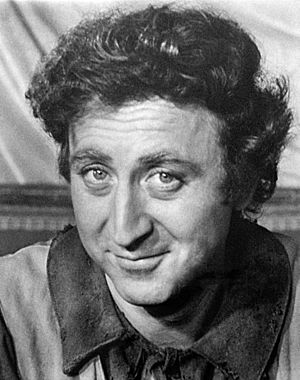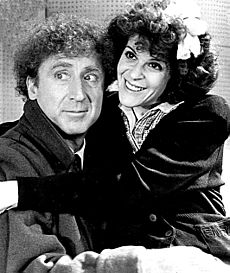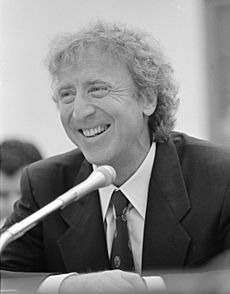Gene Wilder facts for kids
Quick facts for kids
Gene Wilder
|
|
|---|---|

Wilder in 1970
|
|
| Born |
Jerome Silberman
June 11, 1933 Milwaukee, Wisconsin, U.S.
|
| Died | August 29, 2016 (aged 83) Stamford, Connecticut, U.S.
|
| Alma mater |
|
| Occupation |
|
| Years active |
|
| Spouse(s) |
Mary Mercier
(m. 1960; div. 1965)Mary Joan Schutz
(m. 1967; div. 1974)Karen Boyer
(m. 1991) |
| Children | 1 |
| Relatives | Jordan Walker-Pearlman (nephew) |
| Military career | |
| Service/ |
United States Army |
| Years of service | 1956–1958 |
| Signature | |
 |
|
Jerome Silberman (June 11, 1933 – August 29, 2016), known professionally as Gene Wilder, was an American actor, comedian, writer and filmmaker.
Contents
Early life and education
Wilder was born Jerome Silberman on June 11, 1933, in Milwaukee, Wisconsin, the son of Jeanne (Baer) and William J. Silberman, a manufacturer and salesman of novelty items. His father was a Russian-Jewish immigrant, as were his maternal grandparents. Wilder first became interested in acting at age eight, when his mother was diagnosed with rheumatic fever and the doctor told him to "try and make her laugh."
At the age of 11, he saw his sister, who was studying acting, performing onstage, and he was enthralled by the experience. He asked her teacher if he could become his student, and the teacher said that if he was still interested at age 13, he would take Wilder on as a student. The day after Wilder turned 13, he called the teacher, who accepted him; Wilder studied with him for two years.
When Jeanne Silberman felt that her son's potential was not being fully realized in Wisconsin, she sent him to Black-Foxe, a military institute in Hollywood. After an unsuccessful short stay at Black-Foxe, Wilder returned home and became increasingly involved with the local theater community. He performed for the first time in front of a paying audience at age 15, as Balthasar (Romeo's servant) in a production of Shakespeare's Romeo and Juliet. Gene Wilder graduated from Washington High School in Milwaukee in 1951.
Wilder studied Communication and Theatre Arts at the University of Iowa, where he was a member of the Alpha Epsilon Pi fraternity. Following his 1955 graduation from Iowa, he was accepted at the Bristol Old Vic Theatre School in Bristol, England. After six months of studying fencing, Wilder became the first freshman to win the All-School Fencing Championship. Desiring to study Stanislavski's system, he returned to the US, living with his sister and her family in Queens, New York City. He enrolled at the HB Studio.
Military service
Wilder was drafted into the Army on September 10, 1956. At the end of recruit training, he was assigned to the medical corps and sent to Fort Sam Houston for training. He was then given the opportunity to choose any post that was open, and wanting to stay near New York City to attend acting classes at the HB Studio, he chose to serve as paramedic in the Department of Psychiatry and Neurology at Valley Forge Army Hospital, in Phoenixville, Pennsylvania. In November 1957, his mother died from ovarian cancer. He was discharged from the army a year later and returned to New York. A scholarship to the HB Studio allowed him to become a full-time student. At first living on unemployment insurance and some savings, he later supported himself with odd jobs such as a limousine driver and fencing instructor.
Acting career
Wilder's first professional acting job was in Cambridge, Massachusetts, where he played the Second Officer in Herbert Berghof's production of Twelfth Night. He also served as a fencing choreographer. After beginning his career on stage, Wilder made his screen debut in an episode of the TV series The Play of the Week in 1961. Although his first film role was portraying a hostage in the 1967 motion picture Bonnie and Clyde, Wilder's first major role was as Leopold Bloom in the 1967 film The Producers, for which he was nominated for an Academy Award for Best Supporting Actor. This was the first in a series of collaborations with writer/director Mel Brooks, including Young Frankenstein, which Wilder co-wrote, garnering the pair an Academy Award nomination for Best Adapted Screenplay.
Wilder was known mainly for his comedic roles, but also for his portrayal of Willy Wonka in Willy Wonka & the Chocolate Factory (1971). He collaborated with Mel Brooks on the films The Producers (1967), Blazing Saddles (1974) and Young Frankenstein (1974), as well as with Richard Pryor in the films Silver Streak (1976), Stir Crazy (1980), See No Evil, Hear No Evil (1989) and Another You (1991).
Wilder directed and wrote several of his own films, including The Woman in Red (1984). With his third wife, Gilda Radner, he starred in three films, the last two of which he also directed. Her 1989 death from ovarian cancer led to his active involvement in promoting cancer awareness and treatment, helping found the Gilda Radner Ovarian Cancer Detection Center in Los Angeles and co-founding Gilda's Club. After his last acting performance in 2003 – a guest role on Will & Grace for which he received an Primetime Emmy Award for Outstanding Guest Actor in a Comedy Series – Wilder turned his attention to writing. He produced a memoir in 2005 as well as five other books.
Death
Wilder died on August 29, 2016, at the age of 83, at home in Stamford, Connecticut, from complications of Alzheimer's disease. He had been diagnosed 3 years before his death but kept knowledge of his condition private.
According to his family, Wilder died while listening to one of his favorite songs, a rendition of "Over the Rainbow" sung by Ella Fitzgerald.
Wilder was included in the Academy of Motion Pictures Arts and Sciences In Memoriam montage during the Oscars telecast.
Personal life
Wilder met his first wife, Mary Mercier, while studying at the HB Studio in New York. Although the couple had not been together long, they married on July 22, 1960. They spent long periods of time apart, eventually divorcing in 1965. A few months later, Wilder began dating Mary Joan Schutz, a friend of his sister. Schutz had a daughter, Katharine, from a previous marriage. When Katharine started calling Wilder "Dad", he decided to do what he felt was "the right thing to do", marrying Schutz on October 27, 1967, and adopting Katharine that same year. Schutz and Wilder separated after seven years of marriage. After the divorce, he briefly dated his other Frankenstein co-star, Teri Garr. Wilder eventually became estranged from Katharine.
Wilder met Saturday Night Live actress Gilda Radner on August 13, 1981, while filming Sidney Poitier's Hanky Panky. Radner was married to guitarist G. E. Smith at the time, but Wilder and she became inseparable friends. The relationship grew, and Radner eventually divorced Smith in 1982. She moved in with Wilder, and the couple married on September 14, 1984, in the south of France. Radner was diagnosed with ovarian cancer in October 1986. Over the next year and a half, Radner battled the disease, receiving chemotherapy and radiotherapy treatments. The disease finally went into remission, giving the couple a respite, during which time Wilder filmed See No Evil, Hear No Evil. By May 1989, the cancer returned and had metastasized. Radner died on May 20, 1989.
Following Radner's death, Wilder became active in promoting cancer awareness and treatment, helping found the Gilda Radner Ovarian Cancer Detection Center in Los Angeles and co-founding Gilda's Club, a support group to raise awareness of cancer that began in New York City and now has branches throughout the country.
While preparing for his role as a deaf man in See No Evil, Hear No Evil, Wilder met Karen Webb (née Boyer), who was a clinical supervisor for the New York League for the Hard of Hearing. Webb coached him in lip reading. Following Gilda Radner's death, Wilder and Webb reconnected, and on September 8, 1991, they married. The two lived in Stamford, Connecticut, in the 1734 Colonial home that he had shared with Radner.
Filmography
Film
| Year | Title | Role | Notes |
|---|---|---|---|
| 1967 | Bonnie and Clyde | Eugene Grizzard | |
| The Producers | Leopold "Leo" Bloom | Nominated: Academy Award for Best Supporting Actor | |
| 1970 | Start the Revolution Without Me | Claude / Philippe | |
| Quackser Fortune Has a Cousin in the Bronx | Aloysius "Quackser" Fortune | ||
| 1971 | Willy Wonka & the Chocolate Factory | Willy Wonka | |
| 1974 | Rhinoceros | Stanley | |
| Blazing Saddles | Jim, "The Waco Kid" | ||
| The Little Prince | The Fox | ||
| Young Frankenstein | Dr. Frederick Frankenstein | Also writer Nominated: Academy Award for Best Adapted Screenplay |
|
| 1975 | The Adventure of Sherlock Holmes' Smarter Brother | Sigerson Holmes | Also director and writer |
| 1976 | Silver Streak | George Caldwell | |
| 1977 | The World's Greatest Lover | Rudy Hickman | Also producer, director, and writer |
| 1979 | The Frisco Kid | Avram Belinski | |
| 1980 | Sunday Lovers | Skippy | Directed "Skippy" segment |
| Stir Crazy | Skip Donahue | ||
| 1982 | Hanky Panky | Michael Jordon | |
| 1984 | The Woman in Red | Teddy Pierce | Also director and writer |
| 1986 | Haunted Honeymoon | Larry Abbot | Also director and writer |
| 1989 | See No Evil, Hear No Evil | Dave Lyons | Also writer |
| 1990 | Funny About Love | Duffy Bergman | |
| 1991 | Another You | George / Abe Fielding | |
| 2005 | Expo: Magic of the White City | Narrator | Documentary (Final film role) |
Television
| Year | Title | Role | Notes |
|---|---|---|---|
| 1961 | The Play of the Week | Happy Penny | Episode: "The Wingless Victory" |
| 1962 | Armstrong Circle Theatre | Yussel | Episode: "The Man Who Refused to Die" |
| 1962 | The Defenders | Waiter | Episode: "Reunion with Death" |
| 1962–1963 | The DuPont Show of the Week | Muller / Wilson / Reporter | 3 episodes |
| 1966 | The Eternal Light | Yonkel | Episode: "Home for Passover" |
| 1966 | Death of a Salesman | Bernard | TV film |
| 1972–1977 | The Electric Company | Letterman (Voice) | The Adventures of Letterman segment |
| 1972 | The Scarecrow | Lord Ravensbane / The Scarecrow | TV film |
| 1974 | Thursday's Game | Harry Evers | TV film |
| 1993 | Eligible Dentist | Toby | TV pilot episode |
| 1994–1995 | Something Wilder | Gene Bergman | 18 episodes |
| 1999 | Murder in a Small Town | Larry "Cash" Carter | TV film, co-writer with Gilbert Pearlman |
| 1999 | Alice in Wonderland | The Mock Turtle | TV film |
| 1999 | The Lady in Question | Larry "Cash" Carter | TV film, co-writer with Gilbert Pearlman |
| 2002–2003 | Will & Grace | Mr. Stein | 2 episodes |
Theatre
| Year | Title | Role | Venue |
|---|---|---|---|
| 1961 | The Complaisant Lover | Hotel Valet | Ethel Barrymore Theatre, Broadway |
| Roots | Frankie Bryant | Mayfair Theatre, Off-Broadway | |
| 1963 | Mother Courage and Her Children | Chaplain | Martin Beck Theatre, Broadway |
| 1963 | One Flew Over the Cuckoo's Nest | Billy Bibbit | Cort Theatre, Broadway |
| 1964 | Dynamite Tonight | Smiley | York Playhouse, Off-Broadway |
| The White House | Various roles | Henry Miller's Theatre, Broadway | |
| 1966 | Luv | Harry Berlin | Helen Hayes Theatre, Broadway |
| 1996 | Laughter on the 23rd Floor | Max Wilder | Sondheim Theatre, West End |
Awards and nominations
| Award | Year | Category | Work | Result | Ref. |
|---|---|---|---|---|---|
| Academy Awards | 1968 | Best Supporting Actor | The Producers | Nominated | |
| 1974 | Best Adapted Screenplay | Young Frankenstein | Nominated | ||
| Clarence Derwent Awards | 1962 | Best Actor in a Nonfeatured Role | The Complaisant Lover | Won | |
| Golden Globe Awards | 1972 | Best Actor – Motion Picture Musical or Comedy | Willy Wonka & the Chocolate Factory | Nominated | |
| 1976 | Silver Streak | Nominated | |||
| Nebula Award | 1976 | Best Script | Young Frankenstein | Won | |
| Primetime Emmy Awards | 2003 | Outstanding Guest Actor in a Comedy Series | Will & Grace | Won |
Images for kids
See also
 In Spanish: Gene Wilder para niños
In Spanish: Gene Wilder para niños





